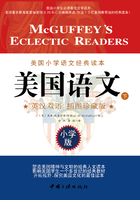
第9章 King Charles II and William Penn 国王查尔斯二世和威廉·佩恩
King Charles. Well, friend William! I have sold you a noble province in North America; but still, I suppose you have no thoughts of going thither yourself?
Penn. Yes, I have, I assure thee, friend Charles; and I am just come to bid thee farewell.
K. C. What! venture yourself among the savages of North America! Why, man, what security have you that you will not be in their war kettle in two hours after setting foot on their shores?
P. The best security in the world.
K. C. I doubt that, friend William; I have no idea of any security against those cannibals but in a regiment of good soldiers, with their muskets and bayonets. And mind, I tell you beforehand, that, with all my good will for you and your family, to whom I am under obligations, I will not send a single soldier with you.
P. I want none of thy soldiers, Charles: I depend on something better than thy soldiers.
K. C. Ah! what may that be?
P. Why, I depend upon themselves; on the working of their own hearts; on their notions of justice; on their moral sense.
K. C. A fine thing, this same moral sense, no doubt; but I fear you will not find much of it among the Indians of North America.
P. And why not among them as well as others?
K. C. Because if they had possessed any, they would not have treated my subjects so barbarously as they have done.
P. That is no proof of the contrary, friend Charles. Thy subjects were the aggressors. When thy subjects first went to North America, they found these poor people the fondest and kindest creatures in the world. Every day they would watch for them to come ashore, and hasten to meet them, and feast them on the best fish, and venison, and corn, which were all they had. In return for this hospitality of the savages, as we call them, thy subjects, termed Christians, seized on their country and rich hunting grounds for farms for themselves. Now, is it to be wondered at, that these much-injured people should have been driven to desperation by such injustice;and that, burning with revenge, they should have committed some excesses?
K. C. Well, then, I hope you will not complain when they come to treat you in the same manner.
P. I am not afraid of it.
K.C. Ah! how will you avoid it? You mean to get their hunting grounds, too, I suppose?
P. Yes, but not by driving these poor people away from them.
K. C. No, indeed? How then will you get their lands?
P. I mean to buy their lands of them.
K. C. Buy their lands of them? Why, man, you have already bought them of me!
P. Yes, I know I have, and at a dear rate, too; but I did it only to get thy good will, not that I thought thou hadst any right to their lands.
K.C. How, man? no right to their lands?
P. No, friend Charles, no right; no right at all: what right hast thou to their lands?
K.C. Why, the right of discovery, to be sure; the right which the Pope and all Christian kings have agreed to give one another.
P. The right of discovery? A strange kind of right, indeed. Now suppose, friend Charles, that some canoe load of these Indians, crossing the sea, and discovering this island of Great Britain, were to claim it as their own, and set it up for sale over thy head, what wouldst thou think of it?
K.C. Why—why—why—I must confess, I should think it a piece of great impudence in them.
P. Well, then, how canst thou, a Christian, and a Christian prince, too, do that which thou so utterly condemnest in these people whom thou callest savages? And suppose, again, that these Indians, on thy refusal to give up thy island of Great Britain, were to make war on thee, and, having weapons more destructive than thine, were to destroy many of thy subjects, and drive the rest away—wouldst thou not think it horribly cruel?
K. C. I must say, friend William, that I should; how can I say otherwise?
P. Well, then, how can I, who call myself a Christian, do what I should abhor even in the heathen? No. I will not do it. But I will buy the right of the proper owners, even of the Indians themselves. By doing this, I shall imitate God himself in his justice and mercy, and thereby insure his blessing on my colony, if I should ever live to plant one in North America.
Mason L. Weems.
查尔斯国王:“嗨,威廉,我的朋友!我把北美一个富裕的省份卖给了你,但我看你好像并不打算去那里。”
佩恩:“不,我的朋友查尔斯,我向你保证,我是打算去的,我正是来向您告别的!”
查:“什么?去北美的荒蛮之地探险!伙计,为什么?难道你有防御队,可以保护你在上岸的两个小时内不会卷入野蛮人的战争中去?”
佩:“是的,世界上最厉害的防御队。”
查:“那也不好说,我的朋友。除非你身边有佩戴步枪与刺刀的勇士保护,否则,你无法抵抗那些吃人族。不过,我得事先说明,我是受过你们的恩惠,但是记住,我给了你和你的家人最好的祝愿,就不会再派给你一兵一卒的。”
佩:“我不想要您的士兵,查尔斯,我要依赖的东西比士兵还好。”
查:“哦,那是什么?”
佩:“我就依赖那些野蛮人,依赖他们的心灵,依赖他们的公正,依赖他们的道德观念。”
查:“不错,毫无疑问道德观念是好东西。但是,恐怕北美的印第安人没有什么道德观念。”
佩:“为什么他们跟别人不一样?”
查:“因为他们哪怕只要拥有一点道德观念,就不会那么野蛮地对待我的臣民了。”
佩:“查尔斯,我的朋友,这并不能说明什么。相反,你的臣民才是侵略者。你的臣民初到北美时,他们发现那里的人是世界上最友好、最善良的生灵。他们每天都注视着你的臣民上岸,然后匆匆跑去迎接他们,用他们最好的鱼、鹿肉和粮食来招待你的臣民。然而作为对这群热情好客的所谓‘野蛮人’的回报,你所谓的‘基督徒’掠夺了他们的家园和富饶的猎场,作为自己的农场。现在这些受到伤害的人被这样的不公平推向了绝望,为了报复,他们才作出一些极端的事来。”
查:“那好吧,如果他们用同样的方法对待你,那么希望你不要向我抱怨什么。”
佩:“我不怕。”
查:“啊,你逃不过的!我猜,你也想掠夺他们的猎场吧!”
佩:“是的,但我不会将那些可怜的人从他们的地盘上赶走。”
查:“真的不会吗?那你怎么得到他们的土地呢?”
佩:“我想购买他们的土地。”
查:“从他们的手里购买土地,可是,伙计,我已经把地卖给你了。”
佩:“是的,我知道,并且您出的价格不菲,但我这样做只是想接受您的好意。我认为他们的土地并不归您所有。”
查:“伙计,怎么可能,我无权拥有他们的土地?”
佩:“是的,查尔斯,我的朋友,你没有权力,一点权力都没有。他们的土地怎么能归您所有呢?”
查:“哇,当然有,发现权。教皇和所有的基督教国王都承认相互给予这样的权利。”
佩:“发现权?真是一个奇怪的权利。我的朋友,假设现在有一些印第安人,他们乘坐独木舟从海上经过时,发现了大不列颠岛屿,他们是不是也可以宣布大不列颠岛屿属于他们,并卖掉它呢?你如何看待这件事呢?”
查:“什么……什么……什么……那我只能说,他们真是厚颜无耻。”
佩:“好,那么,您是一个基督徒,更是基督徒王子,您怎么可以做您谴责的野蛮人所做的事情呢?那么再假设一下,因为您拒绝放弃大不列颠岛屿,那些印第安人就向您发动战争,并且他们的武器比您的更有威力,杀死了您的很多臣民,其余的人也被赶跑了,您会觉得他们很残忍吗?”
查:“威廉,我的朋友,不得不说,我确实认为他们很残忍,我怎么可能不那样想呢?”
佩:“那么,作为一个基督徒,我怎么可能去做自己厌恶甚至痛恨的野蛮人所做的事情呢!不,我绝对不会去做的。但是我会从真正的所有者那里购买,即使他们是印第安人。这样做,我会遵照上帝公正和仁慈的旨意,这样在我的领地才会有上帝的保佑和祝福——假如我可以活到在北美建立自己国家的那一天。”
梅森.L.威姆斯